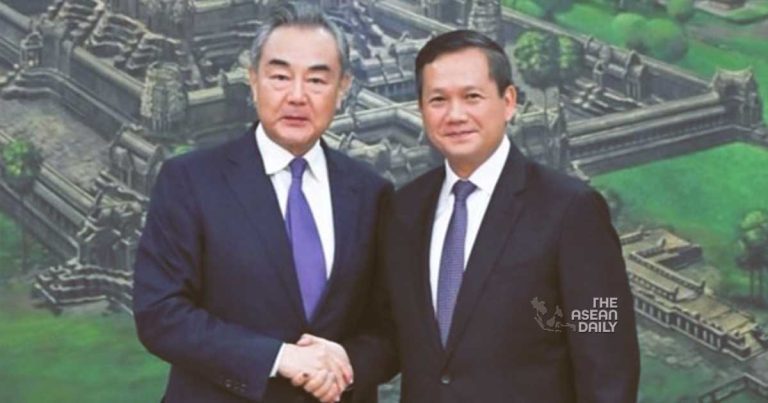14-8-2023 (PHNOM PENH) China’s Foreign Minister, Wang Yi, visited Cambodia over the weekend to reiterate China’s commitment to the Southeast Asian nation. This visit follows the recent transfer of power within Cambodia’s government, where the incumbent prime minister handed over his position to his son after a controversial election last month.
Wang Yi’s visit holds significant diplomatic weight, as he is the first foreign leader to engage with Cambodia following Prime Minister Hun Sen’s announcement that his 45-year-old son, Hun Manet, would be taking over as prime minister. Hun Manet, concurrently the country’s army chief, is stepping into his father’s shoes.
A video capturing the meeting between Wang Yi and Hun Sen was shared on Hun Sen’s Telegram channel on Sunday, underscoring the diplomatic nature of the encounter. Eang Sophalleth, the spokesperson for Hun Sen, reported that during the meeting, Wang expressed China’s eagerness to collaborate with the newly appointed prime minister.
The Cambodian Foreign Ministry released an official statement quoting Wang Yi, who expressed China’s backing for “the Kingdom’s emerging government leadership.” This declaration of support aligns with China’s strategic interest in maintaining a strong relationship with Cambodia.
Hun Sen, who holds the distinction of being Asia’s longest-serving government head, and his political party clinched a resounding victory in the country’s general election. This victory came amidst the controversial decision to exclude the main opposition group, the Candlelight Party, from participating due to a technicality. However, this move was widely criticized by Western nations and rights organizations, who deemed the election neither “free” nor “fair.”
Wang Yi engaged with key figures during his visit, including both Hun Sen and his newly appointed son, as well as Cambodia’s Foreign Minister Prak Sokhonn. Notably, Wang commended the election, characterizing it as “free and fair.” He highlighted the high participation rate of over 80% of Cambodians and the presence of numerous foreign observers.
The succession process was formalized on August 7 when King Norodom Sihamoni officially appointed Hun Manet as the new prime minister. Hun Manet’s assumption of office is slated for August 22, contingent upon the new National Assembly’s endorsement of the new cabinet.
Hun Manet’s entry into politics was marked by his victory in the election, and his transition into the role of premier is part of a larger generational shift within Cambodian politics. A younger generation of lawmakers, many of whom have been educated in Western countries, is anticipated to take up ministerial positions. This generational transition includes figures such as Hun Sen’s youngest son and relatives of senior party members.
China’s strategic partnership with Cambodia holds significance in diplomatic circles. This partnership has helped China counter criticisms within the Association of Southeast Asian Nations (ASEAN), a group that includes members engaged in territorial disputes with China in the South China Sea. Cambodia’s alignment with China has led to Beijing’s increased influence in Cambodian politics and economy. This is evidenced by the proliferation of Chinese-funded projects, hotels, and casinos across the nation. Additionally, China has played a role in financing key infrastructure projects through state banks, contributing to over 40% of Cambodia’s foreign debt.
In a notable military collaboration, China and Cambodia initiated a naval port expansion project in June last year, raising concerns from the U.S. and other nations regarding Beijing’s potential establishment of a strategically vital military outpost in the Gulf of Thailand. While Cambodia’s aging leader, Hun Sen, reportedly granted China the right to set up a military base at the Ream Naval Base in 2019, he has consistently denied these claims, citing Cambodia’s constitutional prohibition of foreign military facilities.
Hun Sen, who celebrated his 71st birthday last Saturday, affirmed that his decision to step down as prime minister is not an end to his political involvement. He envisions serving in various capacities until at least 2033, which would mark his half-century in office. It is anticipated that he will retain substantial influence as president of the Cambodian People’s Party and Senate president.




